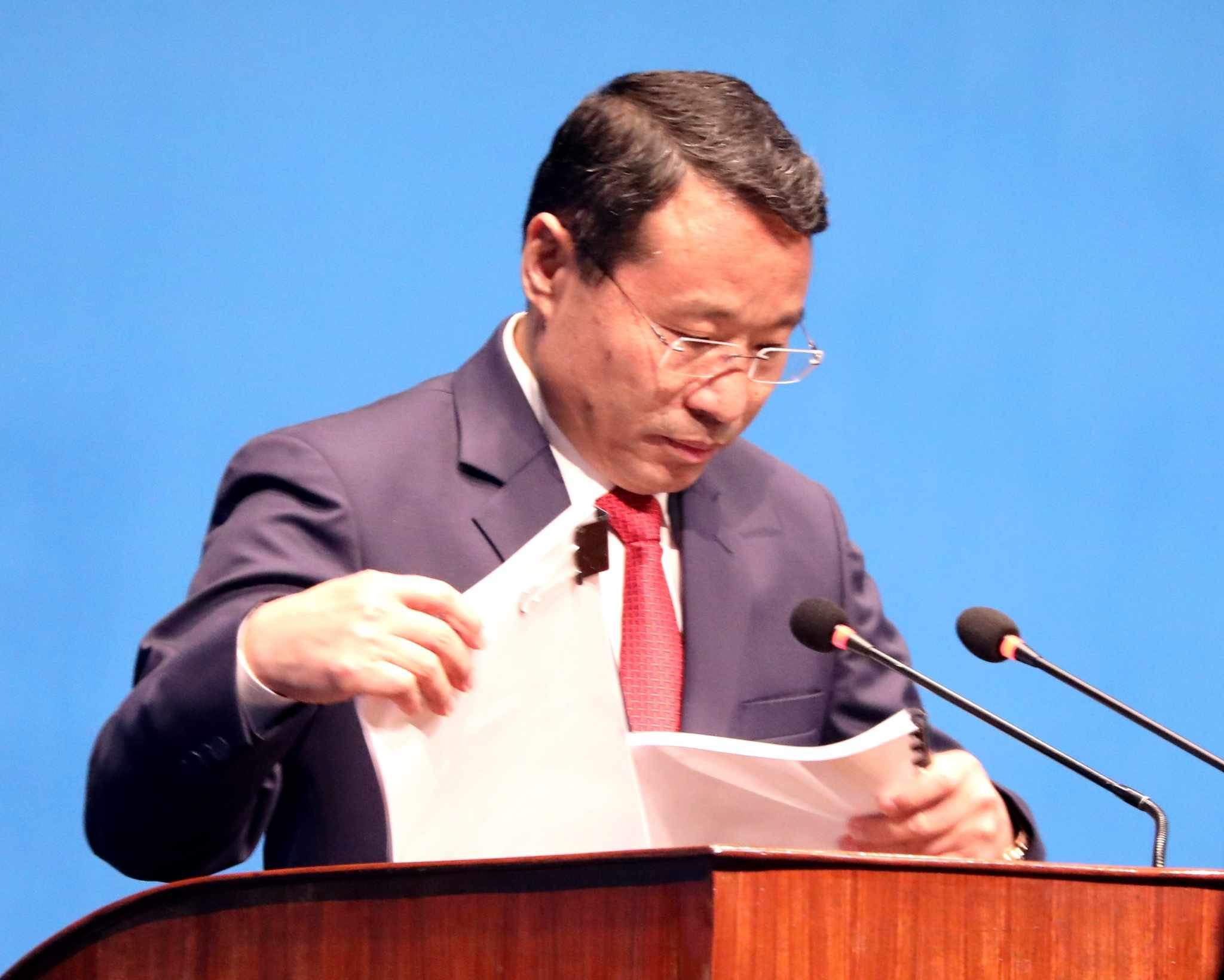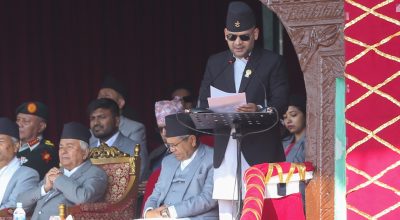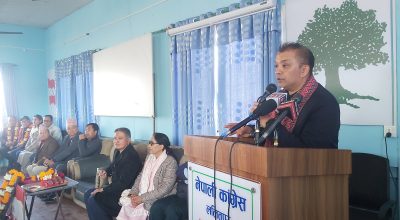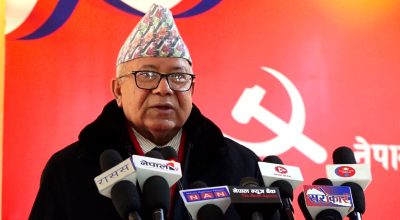
Kathmandu, May 28: At the meeting today of the House of Representatives, Finance Minister Barshman Pun tabled the annual estimates of revenue and expenditure (budget) of the government for the financial year 2024/25.
On the occasion, Speaker Devraj Ghimire fixed June 2, 3 and 4 as the dates for MPs to provide their comments and feedback on the budget while Finance Minister Pun will answer the questions raised in the discussion on June 5.
Members of Parliament will participate in the discussion on the basis of party representation.
Also during the meeting, Minister Pun tabled the ‘Financial Bill, 2081’.
Likewise, the meeting of the HoR today endorsed the ‘Ordinance to Amend Some Nepal Acts on Investment Facilitation, 2081’.
A proposal from Minister for Federal Affairs and General Administration Bhanubhakta Joshi to send the Federal Civil Service Bill, 2080 to the relevant committee for clause-wise discussion was also passed.
Similarly, Minister for Industry Damodar Prasad Bhandari tabled a proposal to send the E-Commerce Bill, 2080, originated in the National Assembly, to the relevant committee for discussion, which was approved by the lower house.
Budget tabled in National Assembly
The annual estimates of revenue and expenditure (budget) for the financial year 2024/25 has been tabled in the meeting of the National Assembly today.
Finance Minister Barshman Pun tabled the budget the meeting of the Assembly.
Meanwhile, Chairperson of the National Assembly, Narayan Prasad Dahal, scheduled June 2, 3 and 4 for general deliberations on the budget in the assembly. Accordingly, the Finance Minister will respond to the questions raised during the discussion on June 4.
President Climate Change Adaptation Programme to be implemented
Government is set to launch the President Climate Change Adaptation and Mitigation Programme. In the budget statement presented by Finance Minister Barshaman Pun at the joint meeting of the Federal Parliament today, it is mentioned that the programme will be implemented in an integrated manner.
“In addition to conducting the programme, disaster management and climate adaptation programme will be implemented in an integrated manner,” the budget reads.
According to the statement, the campaign ‘Save the mountains: save humanity’ has been continued by holding dialogues in national and international platforms about the impact of climate change on the Himalayan and mountainous regions.
Likewise, government is building climate change-adapted infrastructure while constructing physical infrastructure. The goal is to improve climate adaptation and energy efficiency in building construction by the federal, provincial and local levels, it is said in the budget.
The budget statement also states that appropriate technology will be used to minimize and adapt the impact of climate change on the agricultural sector as well.
Green tax on petrol and diesel
The government has imposed a green tax on petroleum products, coal and other related goods.
The Economic Bill-2081 presented in the joint meeting of the Federal Parliament today by Finance Minister Barshaman Pun states that green tax will be levied at the rate of Rs.1 per liter on petrol and diesel. The tax has been proposed with the aim of reducing the use of fossil fuel.
Similarly, green tax equal to 0.5 percent will be levied on furnace oil, base oil and one percent on lubricant oil. Petroleum oil and oil obtained from bituminous minerals, 70 percent or more of petroleum oil will also be taxed by one percent.
Special Budget for the Dalit community
The government has allocated special budget for the Dalit community, a first of its kind.
Finance Minister Barshaman while presenting the budget statement in the joint session of the Federal Parliament today said that Rs. 200 million has been allocated for the establishment of ‘Dalit Development Authority’.
Meanwhile, Dalit rights activists have welcomed the allocation of budget for the Dalit community. Rights activist Ganesh BK said that Dalit-specific budget is positive, though it was not enough.
Presenting the budget, Finance Minister Pun said that the institutional arrangement of the Dalit Development Authority will be made to help realize the constitutional rights of the Dalit community. The budget of Rs 200 million will be invested for job creation and livelihood development programs by modernizing the indigenous skills, knowledge and profession of the Dalit community.
Rights activist Dhankumari Sunar said that the budget can be useful if the initiative is not politicized.
However, writer and activist Sushil BK was of the view that the budget did not address the issue of landless Dalits.
Budget declares Agriculture Investment Decade
The new fiscal year budget unveiled today has prioritized the agriculture sectors ensuring adequate funds for its development. Accordingly, to increase investment in the agricultural sector, the government has declared the period from 2081 to 2091 BS as the ‘Agricultural Investment Decade’.
In the budget statement for the fiscal year 2024/25 presented by Finance Minister Barshman Pun today in the joint meeting of the Federal Parliament, the ‘Investment Decade in Agriculture’ has been announced to increase investment in the agricultural sector from government, private, cooperative and development partners. Budget for the commercialization and modernization of agriculture is expected to increase production and productivity.
The government has launched a programme to promote contract farming with the participation of the government, farmers and businessmen to ensure fair prices and markets for agricultural products. Farms that collect, process and export agricultural produce, provide fertilizer, seeds and other materials needed by local farmers and ensure that they purchase agricultural products, fertilizers, seeds, agricultural extension services and loan interest subsidies will be provided.
It will be ensured to arrange interest subsidy, technical support and tax exemption on import of equipment for agro-products. Individuals, farms and cooperatives who professionally engage in collective farming, animal husbandry and herb cultivation by consolidating more than 50 ropani in the mountains and hills and 10 bigaha in the plains/tarai will be prioritized. To promote the production of agricultural crops such as fine and lustrous rice, sugarcane, corn, milk, fish, meat, coffee, tea, ginger, turmeric, red chillies, onions, potatoes, etc., the market for the produce will be ensured by providing subsidies for advanced seeds, irrigation etc., reads the budget.
A budget of Rs 2.98 billion has been allocated for the Prime Minister’s Agriculture Modernization Project. Fruit cultivation will be expanded on two thousand hectares of land in hilly and high mountain areas. In the next fiscal year, the capacity of 14 government farms will be expanded to produce at least seven hundred thousand quality fruit plants. A state-of-the-art laboratory will be established to produce plants using tissue culture technology.
For development of fruit farming sector, Rs. 1.44 billion have been allocated. A special programme will be conducted to promote the production and export of the national fruit orange in the central mountains, apples in the Himalayas and high mountains, and mangoes and bananas in Tarai-Madhesh in collaboration with the federal, provincial and local levels.
For the commercialization of agriculture, the government will provide initial capital to 300 highway-focused production businesses and ensure the market for the produced goods. One billion 120 million rupees have been allocated for this.
To encourage farmers to promote sugarcane cultivation, Rs. 2.25 billion has been allocated. A total of 1.65 billion rupees have been set aside to provide subsidy on crop and livestock insurance premiums for small farmers. The government has also launched a programme to enhance the capacity of agencies involved in agricultural research, including the National Agricultural Research Council.
Similarly, 75 more agricultural technologies will be developed in the next fiscal year. Three billion 52 million rupees have been allocated for agricultural research and development.
Meanwhile, necessary legal provision for the commercial production of marijuana for medicinal purposes will be arranged.










